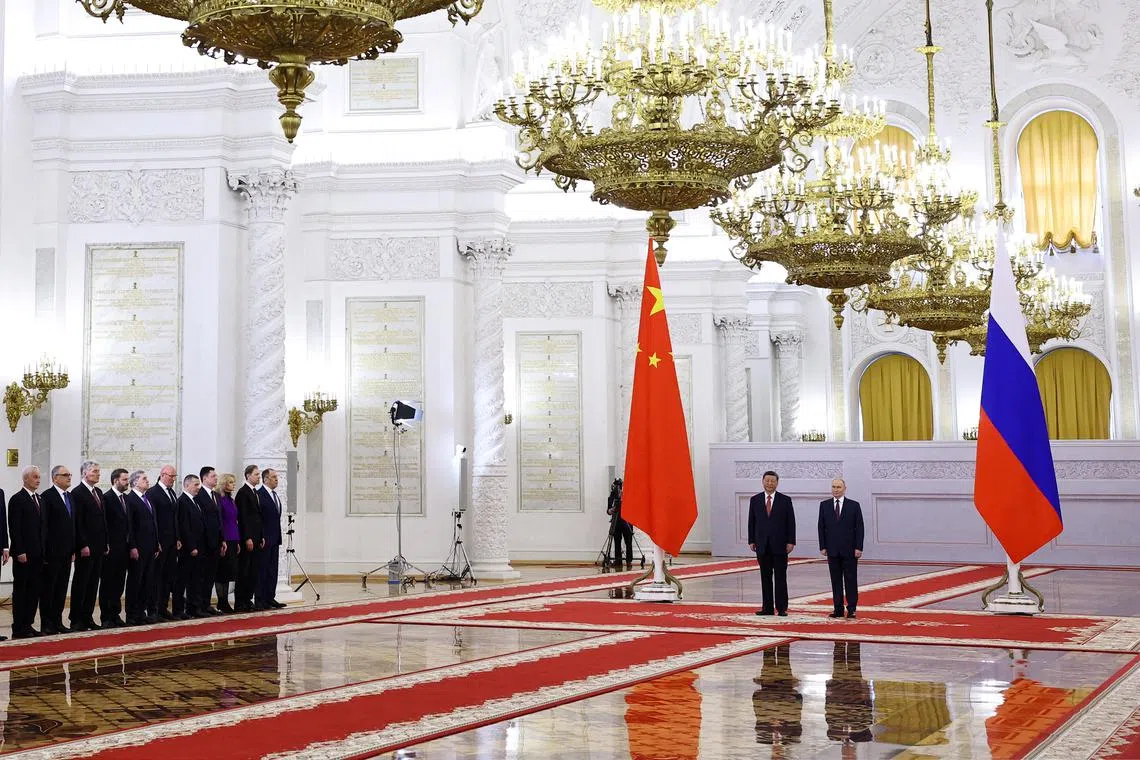Xi tells Putin that Russia and China should be ‘friends of steel’
Sign up now: Get ST's newsletters delivered to your inbox

Russian President Vladimir Putin and Chinese President Xi Jinping spoke after approaching each other from opposite ends of one of the Kremlin’s most opulent halls.
PHOTO: REUTERS
MOSCOW - Chinese President Xi Jinping told Russian leader Vladimir Putin on May 8 that their two countries should be “friends of steel”, as they pledged to boost cooperation to a new level at a time of heightened confrontation with the West.
At talks in the Kremlin, the two leaders cast themselves as defenders of a new world order no longer dominated by the US.
Mr Xi is the most powerful of more than two dozen foreign leaders who are visiting Moscow this week to mark on May 8 the 80th anniversary of the end of World War II – a celebration of huge significance for Mr Putin.
Mr Xi’s participation is an important boost to Mr Putin at a time of acute geopolitical tensions from the Middle East to South Asia, and as Russia comes under pressure from the US in faltering talks aimed at ending the war in Ukraine.
China and Russia should safeguard international fairness and justice and “be true friends of steel that have been through a hundred trials by fire”, Mr Xi told Mr Putin in televised comments.
The two countries should solidify the foundations of their cooperation and “eliminate external interference”, said Mr Xi, whose country is currently engaged in a tariff war launched by US President Donald Trump.
Mr Putin and Mr Xi have met dozens of times and signed a “no limits” strategic partnership in February 2022, less than three weeks before Mr Putin sent his army into Ukraine. China is Russia’s biggest trading partner and has thrown Moscow an economic lifeline that has helped it navigate Western sanctions.
Mr Putin said the two leaders would personally oversee all key elements in the relationship, aiming for a substantial boost to trade and investment by 2030.
Powerful guest
Domestically, the World War II anniversary offers Mr Putin a chance to rally Russians in remembrance of a historic feat that is central to the country’s national identity. The Soviet Union lost 27 million people in the war, including many millions in Ukraine, which was also devastated.
On the world stage, Mr Putin aims to show that he has powerful allies, and to demonstrate that years of Western sanctions have failed to isolate Russia.
In opening remarks after greeting Mr Xi in one of the Kremlin’s most opulent halls, Mr Putin thanked him for coming to Moscow to mark 80 years since the “sacred” victory over Adolf Hitler.
“The victory over fascism, achieved at the cost of enormous sacrifices, is of lasting significance,” Mr Putin said.
“Together with our Chinese friends, we firmly stand guard over historical truth, protect the memory of the events of the war years, and counteract modern manifestations of neo-Nazism and militarism.”
Mr Putin has portrayed his war in Ukraine as a struggle against modern-day Nazis from the start. Ukraine and its allies reject that characterisation as a grotesque falsehood, accusing Moscow of conducting an imperial-style invasion.
Mr Xi said the two countries, as world powers and permanent members of the UN Security Council, would work together to counter “unilateralism and bullying” – an implied reference to the US.
Ceasefire pressure
Mr Putin announced last week a unilateral three-day ceasefire in the war with Ukraine, beginning on May 8. Ukraine has not committed to abide by it, calling it a ruse by Mr Putin to create the impression he wants to end the war. Instead, it has declared its willingness to join a ceasefire lasting at least 30 days.
Both countries are under pressure from Mr Trump to reach a peace deal, and Washington has threatened repeatedly to walk away from talks unless there is clear progress.
Ukraine targeted Moscow with drones for three days earlier this week, but the skies above the capital were calm on May 8.
With so many foreign leaders present, any attacks during the May 9 events could embarrass Mr Putin and would likely draw a tough response from Moscow.
A Ukrainian military spokesperson told Reuters that Russian troops had continued to conduct assaults in several areas on the eastern front, despite the ceasefire.
Russia’s Defence Ministry said Ukrainian forces had made two attempts to break through the border into Russia’s Kursk region since the start of the ceasefire. Reuters could not independently verify the claims by either side.
Chinese troops will take part in the May 9 military parade in the Red Square, the centrepiece of the commemorations.
Ukraine’s Foreign Ministry on May 6 urged countries not to send their militaries to participate, saying it would go against some countries’ declared neutrality in the war.
Mr Xi has called for talks to end the conflict in Ukraine and has accused the US of stoking it with weapons supplies to Kyiv.
Ukrainian President Volodymyr Zelensky has in the past urged him to try to persuade Mr Putin to halt the war. REUTERS


